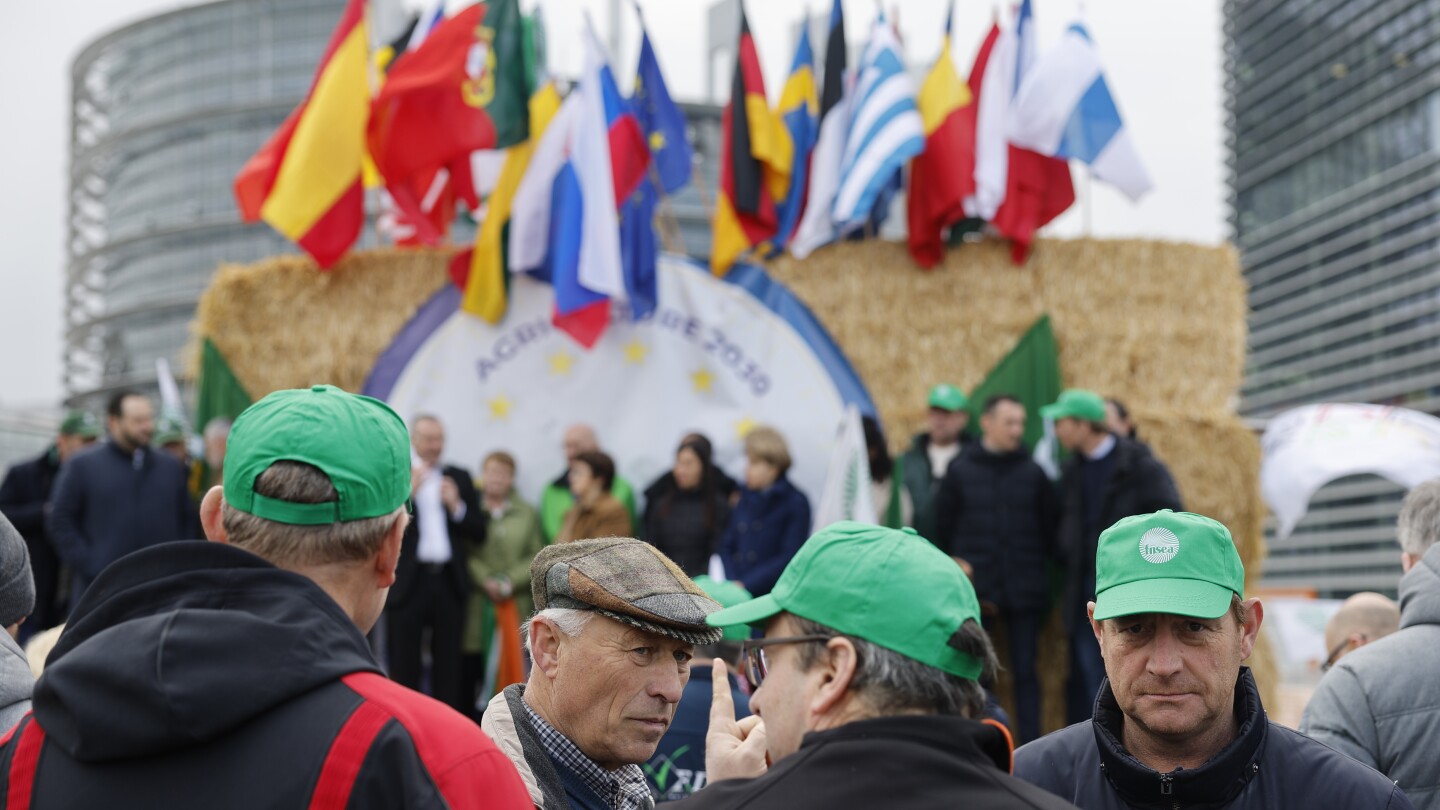Plain Jane
Just Plain Jane
The EU is looking for a short term fix to get them past the EU elections in June.

 apnews.com
apnews.com
BY SAMUEL PETREQUIN
Updated 5:36 AM EDT, March 20, 2024
Share
BRUSSELS (AP) — European Union lawmakers agreed Wednesday to renew Ukraine’s import rates, which have been in place since shortly after Russia invaded, while adding protective measures for agricultural products such as grain and honey to address the concerns of farmers across the 27-nation bloc.
Farmers angry at red tape and competition from cheap imports from select countries have been vehemently protesting in recent weeks across the bloc. Poland was among the countries leading the charge against duty-free imports after Polish farmers blocked border crossings with Ukraine in February, spilling Ukrainian grain and burning tires as they intensified a nationwide protest against the import of Ukrainian foods and European Union environmental policies.
Under the deal struck in the early hours of Wednesday, the EU would renew its temporary suspension of import duties and quotas on Ukrainian agricultural exports to the bloc, first granted in 2022 to support Ukraine in the war against Russia.
However, it comes with a reinforced safeguard that will force the EU’s executive arm, the European Commission, “to reintroduce tariff-rate quotas if imports of poultry, eggs, sugar, oats, maize, groats and honey” surpass the average volumes imported in 2022 and 2023. This would limit cheap imports of those goods with the goal of keeping domestic farmers competitive in the market for such staples.
The contingency initially covered poultry, eggs, and sugar, but was extended to oats, maize, groats and honey.
EU lawmakers said they also “attained firm commitments from the Commission to take action if there is a surge of Ukrainian imports of wheat.”
Parliamentary rapporteur Sandra Kalniete said the deal struck a good balance between the needs to stand by Ukraine and to preserve EU farmers’ interests.
“Russia’s targeting of Ukraine and its food production also impacts EU farmers,” she said. “The Parliament heard their concerns, and bolstered safeguard measures that would alleviate the pressure on EU farmers should they be overwhelmed by a sudden surge in Ukrainian imports.”
The deal, struck on the eve of a summit of EU leaders in Brussels, now needs to be formally approved by both the Parliament and member countries to enter into force in early June and extend to June 5, 2025.
The EU's new import deal would support Ukraine while protecting the bloc's farmers
European Union lawmakers have agreed to renew Ukraine’s import rates, which have been in place since shortly after Russia invaded while adding protective measures for agricultural products such as grain and honey to address the concerns of farmers across the 27-nation bloc.
The EU’s new import deal would support Ukraine while protecting the bloc’s farmers
BY SAMUEL PETREQUIN
Updated 5:36 AM EDT, March 20, 2024
Share
BRUSSELS (AP) — European Union lawmakers agreed Wednesday to renew Ukraine’s import rates, which have been in place since shortly after Russia invaded, while adding protective measures for agricultural products such as grain and honey to address the concerns of farmers across the 27-nation bloc.
Farmers angry at red tape and competition from cheap imports from select countries have been vehemently protesting in recent weeks across the bloc. Poland was among the countries leading the charge against duty-free imports after Polish farmers blocked border crossings with Ukraine in February, spilling Ukrainian grain and burning tires as they intensified a nationwide protest against the import of Ukrainian foods and European Union environmental policies.
Under the deal struck in the early hours of Wednesday, the EU would renew its temporary suspension of import duties and quotas on Ukrainian agricultural exports to the bloc, first granted in 2022 to support Ukraine in the war against Russia.
However, it comes with a reinforced safeguard that will force the EU’s executive arm, the European Commission, “to reintroduce tariff-rate quotas if imports of poultry, eggs, sugar, oats, maize, groats and honey” surpass the average volumes imported in 2022 and 2023. This would limit cheap imports of those goods with the goal of keeping domestic farmers competitive in the market for such staples.
The contingency initially covered poultry, eggs, and sugar, but was extended to oats, maize, groats and honey.
EU lawmakers said they also “attained firm commitments from the Commission to take action if there is a surge of Ukrainian imports of wheat.”
Parliamentary rapporteur Sandra Kalniete said the deal struck a good balance between the needs to stand by Ukraine and to preserve EU farmers’ interests.
“Russia’s targeting of Ukraine and its food production also impacts EU farmers,” she said. “The Parliament heard their concerns, and bolstered safeguard measures that would alleviate the pressure on EU farmers should they be overwhelmed by a sudden surge in Ukrainian imports.”
The deal, struck on the eve of a summit of EU leaders in Brussels, now needs to be formally approved by both the Parliament and member countries to enter into force in early June and extend to June 5, 2025.

